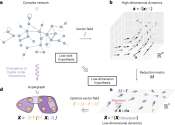Validating the low-rank hypothesis in complex systems
In a new study, scientists have investigated the pervasive low-rank hypothesis in complex systems, demonstrating that despite high-dimensional nonlinear dynamics, many real networks exhibit rapidly decreasing singular values, ...









